The ketogenic diet was originally developed almost 100 years ago to treat epilepsy. Nowadays, it is used as a nutrition plan by health-conscious men and women to optimize body composition and athletic performance.
Recent research suggests that high fat, very-low carb diets have another benefit: They may help control glucose, triglycerides, insulin, and body weight in people with diabetes. The research below shows the ketogenic diet may be an effective tool you can use to manage symptoms of Diabetes, alongside exercise and medication.
Cutting through the Fat: What is Diabetes?
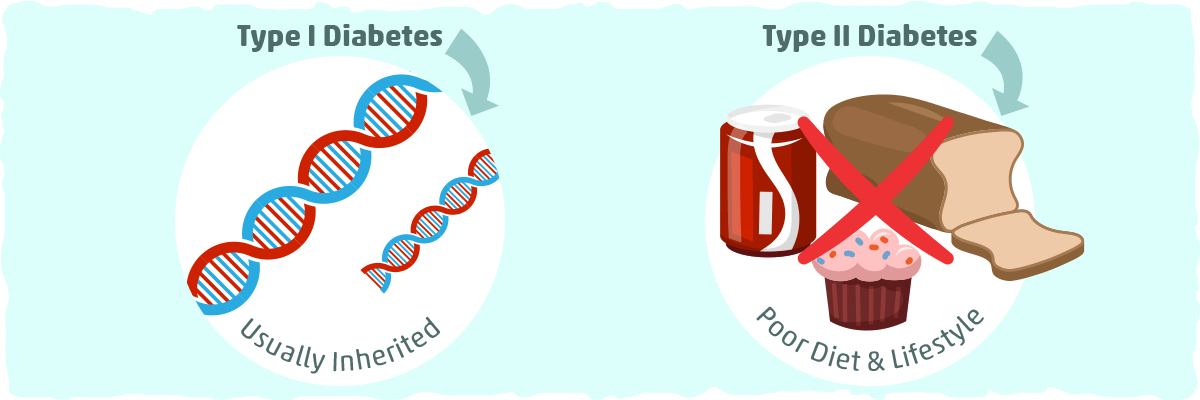
Before we get to research, we need to review some basic medical terminology. Diabetes is a group of metabolic diseases in which the body has elevated blood levels its main energy source: a sugar called glucose.
There are two reasons why this occurs. In some people, there is an insufficient production of a chemical called insulin, a hormone produced by the pancreas that lower levels of glucose in the blood. People who suffer from low insulin levels have type I diabetes and they comprise approximately 5 to 10% of all diabetics. [1]
Type I diabetes is usually inherited and type I diabetics usually have to inject insulin to maintain proper levels of blood glucose. The other 90% to 95% of people with diabetes are type II diabetics. [1] In this version, the body doesn’t produce enough insulin for proper function or cells in the body do not react to insulin and take in sugar from the blood.
Type 2 diabetes is not inherited. However, lifestyle factors such as high body weight, poor exercise and eating habits all increase the risk of developing type 2 diabetes. [2] It can be managed by improving dietary and lifestyle habits and also using proper medication. [2]
Diabetes results in a higher concentration of serum blood glucose. Over time, this higher level of serum blood glucose leads to increased production of insulin, elevated levels of the energy-storing fat molecules called triglycerides, and generally increased body weight.
Because of excess sugar, red blood cells called hemoglobin are coated with sugar. These “sugar-coated” hemoglobin cells are called hemoglobin A1C- also known as HbA1c. Doctors will often measure the proportion of HbA1c to regular hemoglobin to determine if you have diabetes.
If not managed correctly, high blood sugar in diabetics can damage blood vessels and lead to a variety of illnesses. Unmanaged diabetes doubles the risk of cardiovascular diseases such as coronary artery diseases and stroke. [3, 4] Diabetes can damage small vessels in the eyes, kidneys, and nerves and lead to complications such as blindness and kidney disease. [4]
Diabetes is one of the most common chronic diseases in the world. In 2014, diabetes affected about 387 million people worldwide and resulted in $612 billion dollars of health-related costs. [5] Unfortunately, as a conventional western lifestyle of poor nutrition and exercise habits becomes more popular, diabetes is expected to affect about 592 million people worldwide. [6] In the United States alone, diabetes increased from 5.58 diagnosed cases in 1980 to 22.3 million diagnose cases in 2013. [7]
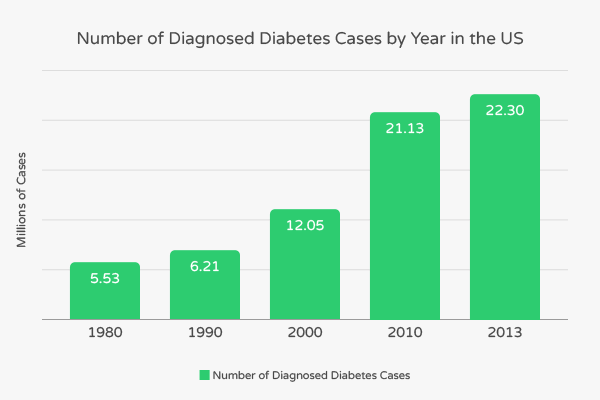
With the increasing prevalence, cost-burden, and long-term implications of diabetes, researchers are looking for a more effective method to prevent and manage symptoms of diabetes. Because ketogenic diets greatly restrict carbohydrate, some surmise that the ketogenic diet could be an effective dietary intervention. But is it effective and safe?
The Ketogenic Connection: Can Fat Fight Diabetes?
One of the first studies investigating the impact of a low-carbohydrate, ketogenic diet (LCKD) was performed by researchers at Duke University Medical Center in 2005. In their study, researchers recruited 28 overweight participants with type 2 diabetes for a 16-week intervention trial.
The subjects had a mean BMI of 42.2, mean age of 56 years, and were of either African-American or Caucasian descent. In their intervention, subjects consumed a LCKD diet with the goal of eating less than 20 grams of carbohydrates per day while reducing dosages of diabetes medication. Subjects also received nutritional counseling and medication adjustment every two weeks.
In the 21 subjects the successfully completed the study, scientists observed a 16% decrease in Hemoglobin Ac from baseline to week 16. [8] Subjects experienced an average decrease in body weight of 8.7 kg (19.2 lbs.). [8] Additionally, their average blood glucose levels decreased a total of 16.6% and their average triglyceride levels decreased 41.6%. [8]
Overall, most subjects reduced or discontinued their diabetes medications. The researchers concluded that “the LCKD can be very effective at lowering blood glucose.” [8] However, in order for the most effective outcomes, patients on LCKD should consult their doctor or someone capable of adjusting their medication. [8]
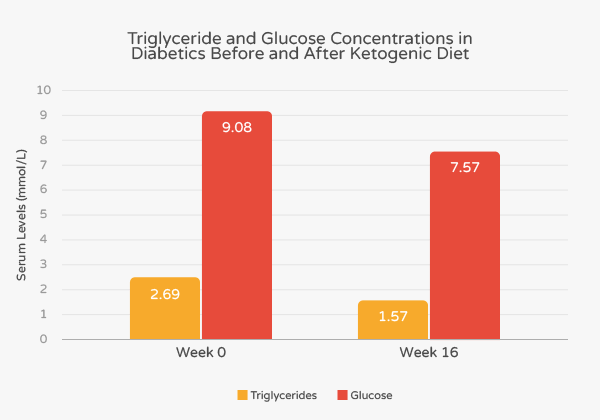
Key Takeaways: Adhering to a very low carbohydrate ketogenic diet (LCKD) can reduce key markers related to type II diabetes in overweight, male subjects such as BMI, body weight, and blood levels of glucose, triglycerides, and hemoglobin A1C.
Recommendations: If you are overweight and have type II diabetes, using a ketogenic diet could be a solution to manage symptoms and reduce medication use.
Ketogenic vs. Low-Calorie Diet for Type II Diabetes
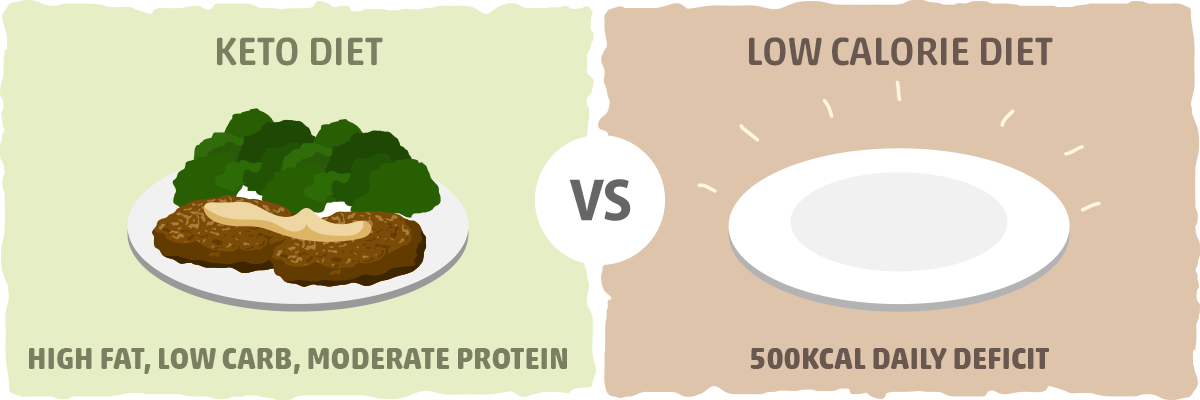
In a 24-week long intervention study, researchers recruited 84 obese subjects with type 2 diabetes and randomly divided them into two groups. The first group of 42 received a low-glycemic diet with a 500 calorie/day deficit. The second group ate a very low carbohydrate ketogenic diet with less than 20 grams of carbohydrates per day without calorie restriction.
Both groups were also underwent identical exercise regimens and had same access to nutritional coaching and group meetings. Researchers measured key diabetes markers including fasting glucose, body mass index (BMI), body weight (kg) and hemoglobin A1c at the beginning of the study, the midpoint (week 12), and the end (week 24).
Both groups experienced no notable adverse effects in their health. In the 29 subjects who successfully completed the calorie-restricted diet, researchers observed an average 16% reduction in fasting glucose, 2.7 reduction in BMI, and loss of 6.9 kg of bodyweight. [9] However, in the 21 subjects that successfully completed the very-low carbohydrate ketogenic diet, subjects experienced an average 19.9% reduction in fasting glucose, 3.9 decrease in BMI, and loss of 11.1 kg of bodyweight. [9]
When compared to the calorie-restrict diet, the subjects who underwent the ketogenic diet experienced a reduction three times greater in hemoglobin A1C (1.5% vs. 0.5%). [9] In addition to observing greater improvements in diabetes-related markers, researchers observed a greater reduction in medication usage in subjects that underwent the ketogenic diet treatment. Thus, due to their overall findings, the researchers stated that “Lifestyle modification using low carbohydrate interventions is effective for improving and reversing type 2 diabetes.” [9]
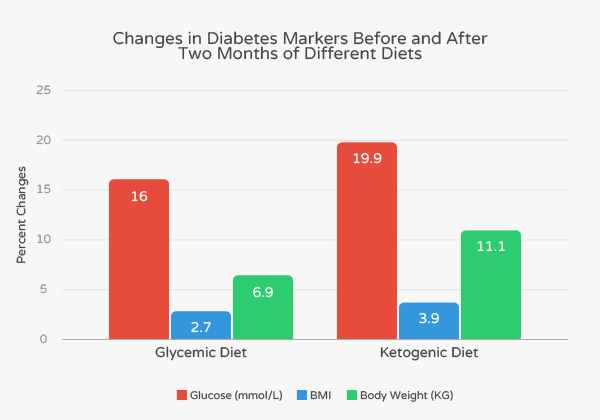
Another study sought to broaden the scope of the ketogenic diet’s impact on weight and symptoms of diabetes by examining a large, non-white patient population. In 2012, researchers in the United Arab Emirates recruited 363 overweight and obese participants for a 24 week intervention trial.
102 of these subjects had type 2 diabetes. The subjects were divided into two groups: one consumed a low-calorie diet (LCD) while the other consumed a low-carbohydrate ketogenic diet (LCKD). Both also underwent equal exercise and nutritional training. Every four weeks, the researchers measured levels of waist circumference, blood glucose level, levels of glycosylated hemoglobin, and triglycerides.
At the conclusion of the intervention, both groups had improved in all metrics but “these changes were more significant in subjects who were on the LCKD as compared with those on the LCD.” [10]. As a result, the researchers supported the study outlined above and concluded that their “…study shows the beneficial effects of a ketogenic diet over the conventional LCD in obese diabetic subjects.” [10]
However, because the drop in glucose can be very sudden, it is very important to monitor blood glucose when using the ketogenic diet.
Key Takeaways: When compared to a calorie-restricted diet, a very-low carbohydrate ketogenic diet leads to greater improvements in symptoms associated with type II diabetes in obese subjects
Recommendations: If you are willing to undergo the strict ketogenic diet, it could be an effective method in managing symptoms associated with type II diabetes.
Keto and Type 2 Diabetes: The New Type 2 Diabetes Diet?
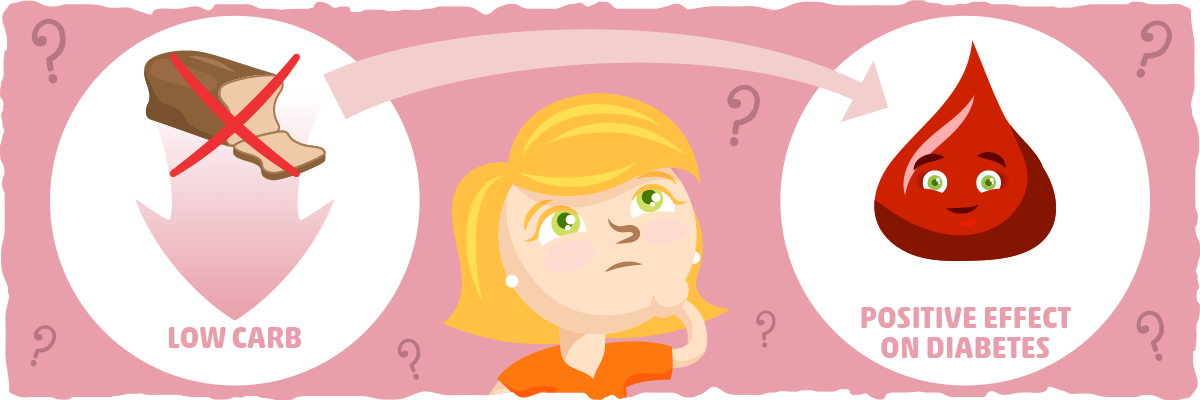
After breaking down the data from the previous studies, a definitive pattern begins to emerge: cutting carbs causes a reduction in diabetes-related biomarkers. In some cases, the keto diet was even able to reverse type 2 diabetes completely.
Despite the promising evidence, we must remain skeptical. A few studies can only provide us with clues as to what might be the better dietary intervention for people with type 2 diabetes. To find out if carb restriction can take the throne as the most effective type 2 diabetes diet, we must look at the bigger picture of the data with the help of high-quality meta-analyses.
The first meta-analysis worth noting collected the data from 10 randomized trials comprising 1376 participants in total. [14] After analyzing the research, a key relationship emerged between dietary carbs and blood sugar levels. In short, the researchers described their finding thus: “the greater the carbohydrate restriction, the greater glucose lowering…” [14]
However, the meta-analysis was riddled with confounding variables — one of which being their lackadaisical definition of a low-carb diet. The researchers identified a low-carb diet as a diet where less than 45% of its calories come from carbs. With such a lax criterion for low-carb, it is difficult to tell if a true low-carb diet (i.e., fewer than 26% of calories coming from carbs) is genuinely the best dietary option for type 2 diabetics.
Fortunately, there are two other meta-analyses that can help take our understanding a giant leap forward. The first one was published in 2017 with the intention of breaking down the current data on how low carb diets affect type 2 diabetes patients. [15]
After analyzing the results from a total of 9 studies with 734 type 2 diabetes patients, the researchers concluded that:
“The results suggested a beneficial effect of LCD [low-carb diet] intervention on glucose control in patients with type 2 diabetes. The LCD intervention also had a positive effect on triglycerides and HDL cholesterol concentrations…” [15]
In other words, low-carb diets can improve the health of type 2 diabetes patients in a variety of different ways that can help reduce the severity of the condition.
However, one question still remains: Does the data support our previous findings that the low carb diet is more effective than other diets for type 2 diabetes? Although many studies indicate this to be the case, the last meta-analysis we will dive into takes a more conservative approach to the current data.
In this meta-analysis, the researchers looked at the results from a total of 20 randomized controlled trials with more than 3,000 subjects, most of whom had type 2 diabetes. [16] Although the authors concluded that low-carbohydrate, low-GI, Mediterranean, and high-protein diets should all be considered as a dietary strategy for diabetes management, the low-carb diet proved itself as being superior in 6 of the 8 studies.
Overall, the results from studies that include low-carb diets showed that they caused a significant decrease in the percentage of HbA1c compared with other diets. In some cases, the reduction in HbA1c was similar to the effect achieved by some diabetes medications. [16]
Also worth noting is that low-carbohydrate, low-GI, and Mediterranean diets led to significant improvements in blood lipids with up to a 4–10% increase in HDL (4% in the Mediterranean, 5% in low-GI, and 10% in low-carbohydrate diets), 1–4% reduction in LDL (1% in low-carbohydrate, 3% in low-GI, and 4% in Mediterranean diets), and 9% reduction in triglycerides. [16]
In conclusion, these three meta-analyses indicate that low-carb isn’t a “miracle diet,” but it may be one of the best, if not the best diet, for the management of type 2 diabetes and reversal of the condition in some cases. When people with type 2 diabetes follow a low-carbohydrate ketogenic diet, their health improves, weight is lost, blood sugar and HbA1c levels drop, and other health parameters improve significantly. Even studies that put healthy individuals on a ketogenic diet found similar improvements.
High-Fat Diets: Prevention for Diabetes?
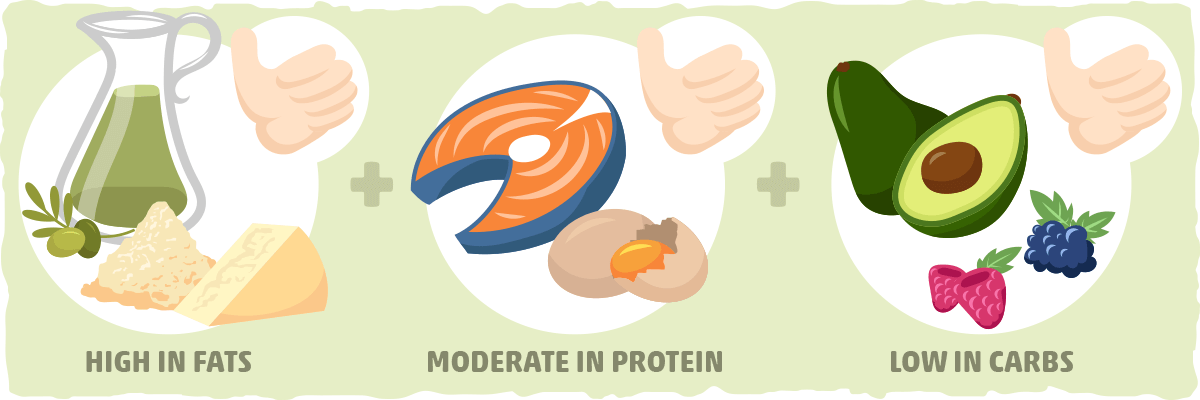
Because ketogenic diets are usually high in saturated fats, many people suspect that they are unhealthy. The research shows that very-low carbohydrate diets are actually beneficial for overweight and obese people who suffer from type II diabetes. However, how do ketogenic diets affect the risk of type II diabetes in healthy subjects?
To investigate this further, researchers recruited 83 non-diabetic subjects with an average age of 48 and BMI of 33. They randomly divided them in one of three equal-calorie diets for 8 weeks. The first one, called the Very Low Fat diet (VLD) consisted of 70% carbohydrates, 10% fat, and 20% protein.
The second diet, called the high unsaturated fat diet (HUF) consisted of 50% carbohydrates, 30% fat, and 20% proteins. In this diet, the bulk of the fat calories (about 90%) were from unsaturated fats. The third diet, called the very low carbohydrate diets (VLCARB), consisted of 4% carbohydrates, 61% fat, and 20% proteins.
About 20% of the fats in this diet were saturated. All subjects also participated in a weight-loss exercise regimen and support from dieticians. Additionally, at the end of the eight weeks, all subjects underwent the same “weight-maintenance” diet and exercise regimen for four weeks.
At the end of this 12 week study, scientists observed similar loss in body fat and overall body weight in all three diets. However, they noted that the VLCARB ketogenic diet was “more effective in improving tracylglycerols, HDL cholesterol, fasting and post-meal glucose and insulin concentrations. More specifically, triacylglycerols decreased by 39.9% in VLCARB subjects, 4.0% in VLF subjects, and 9.6% in HUF subjects. [11]
Insulin levels decreased by 33.6% in VLCARB subjects, decreased by 18.7 % in HUF subjects, and actually increased by 15.1 % in VLD subjects. [11]
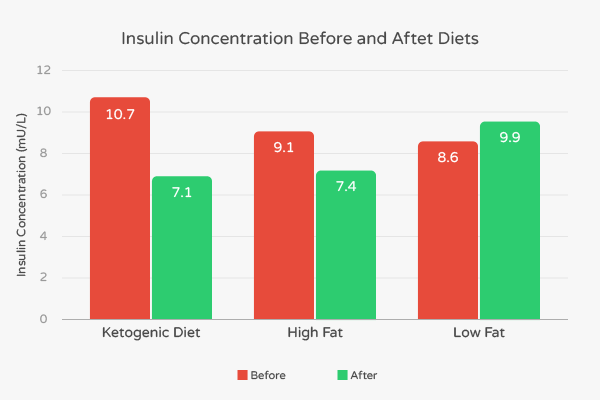
Key Takeaways: Ketogenic diets do not increase the risk of overweight subjects developing type II diabetes or other cardiovascular illnesses. In fact, they could help lower triglycerides and insulin levels when compared to other equal-calorie diets.
Recommendation: If your triglycerides, insulin, and post-meal glucose are high, consider using a ketogenic diet. However, make sure to monitor your cholesterol closely.
What About Keto and Type 1 Diabetes?
The bulk of studies examining the ketogenic diet focus on overweight or obese subjects with type 2 diabetes. But is the ketogenic diet an effective treatment for type 1 diabetics?
Unfortunately, there are no formal research studies examining the impact of the ketogenic diet on glycemic control in type I diabetics. However, a study from 2012 examined the effects of a reduced carbohydrate diet on patients with type 1 diabetes.
In it, researchers recruited 48 subjects with an average age of 24 years and had them consume a reduced carbohydrate diet.
For those that adhered to a reduced carbohydrate diet, their percentage of hemoglobin A1c (HbA1c) was 7.7%, 6.4%, and 6.4% at baseline, 3 months, and 4 years respectively. [12] This indicates that there was a lower serum glucose concentration in the blood in a way that helps manage type 1 diabetes.
There are also a couple of case studies indicating that it is possible for a particular type of keto diet “to halt or reverse autoimmune processes destructing pancreatic beta cell function in [type 1 diabetes].” [17] [18]
The doctors who authored the case studies put their patients on a dairy-free ketogenic diet that consisted mostly of high-quality meats, organ meats, fish, and low-carb vegetables. As long as they followed this dietary approach, their patients were able to live a normal life without needing to take medication.
If you’d like to take a closer look at this promising research, check out our article on type 1 diabetes and the ketogenic diet.
The “Why” Behind the Effectiveness of the Keto Diet for Diabetes
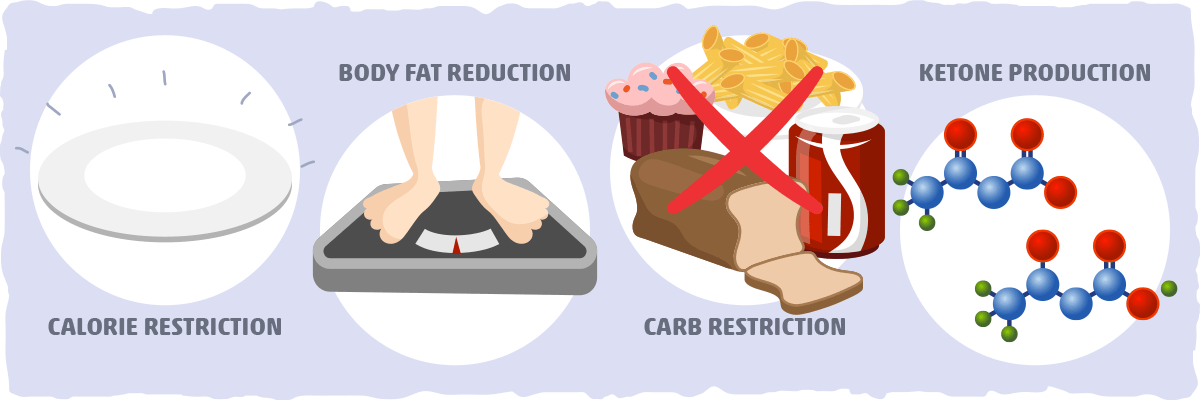
The majority of human studies on how the keto diet impacts blood sugar control share a similar theme: a low-carb, high-fat diet may be the best diet to help manage diabetes.
However, we have yet to explore the mechanisms behind why keto is so effective for diabetes. By understanding the “why” behind the research results, we may be able to extract practical strategies that can help us manage our own blood sugar and HbA1c levels.
According to my interpretation of the research data, here are the four factors that may be responsible for the promising effects of the keto diet:
- Calorie Restriction. Most of the research on type 2 diabetes supports the use of calorie restriction for improving many of the metabolic issues that contribute to the condition. [19] [20] Both the keto diet and low-calorie diets have been shown to help reduce insulin resistance, and many researchers postulate that being in a calorie deficit is the key variable behind these positive effects.[19] [20] For most of us, the keto diet is the better option to experience the benefits of calorie restriction because it allows you to cut your calories naturally without eliciting strong hunger pangs and cravings.
- Body Fat Reduction. According to the current research literature, both visceral and subcutaneous fat play a role in the development of type 2 diabetes. [22] To keep our fat cells from fighting against us, we must adopt a healthier lifestyle that prevents us from being in a calorie surplus and gaining weight. The keto diet is one lifestyle change that has been proven time and time again to help us lose fat and improve metabolic health. [24]
- Carbohydrate Restriction. To help people with diabetes manage their blood sugar levels, doctors will typically prescribe a diet that mostly consists of low glycemic index foods. [23] However, according to the research, restricting overall carb intake to the point of following a keto diet may be the best way to improve the many biomarkers relevant to diabetes. [24] In fact, this dietary strategy has been proven to be helpful for the management of type 2 diabetes and type 1 diabetes.
- By restricting carbs to the degree that the keto diet recommends, you will stimulate the production of ketones and eventually enter nutritional ketosis. As a result, you will start burning more ketones for fuel. Ketones have also been found to help increase weight loss, lower glucose and insulin levels, decrease insulin resistance, and improve energy efficiency. [25] [26]
Although the research has yet to discover all of the mechanisms behind why the keto diet is so helpful for diabetics, these four factors do seem to play a significant role in reducing the severity of type 2 diabetes while also helping with the management of type 1 diabetes. If you’d like to learn more about this topic, consider checking out our article on the keto diet and insulin resistance.
Putting It All Together — Is the Ketogenic Diet Right for You?
The ketogenic diet gets a lot of flak because it is a fairly extreme dietary regimen that challenges the conventional view of “high carbs, low fat”. However, an abundant amount of research supports that very-low carbohydrate, ketogenic diets are actually a healthy lifestyle choice for diabetes.
In fact, many studies suggest that ketogenic diets are more effective in managing and preventing diabetes when compared to low-calorie diets. In a recent critical evaluation of the literature on carbohydrate restriction in managing diabetes, a group of 26 leading researchers stated that there is
“…evidence supporting the use of low-carbohydrate diets as the first approach to treating type 2 diabetes and as the most effective adjunct to pharmacology in type 1. They represent the best-documented, least controversial results.” [13]
Altogether, these promising results can be explained in part by the fact that the keto diet:
- helps us sustain a calorie deficit, which increases insulin sensitivity and lowers blood sugar and HbA1C.
- helps us lose fat, which reduces inflammation and the production of signaling molecules that provoke insulin resistance.
- significantly reduces our glycemic load, which helps us regulate blood sugar levels and decrease our insulin needs.
- stimulates the production and usage of ketones. This can, directly and indirectly, reduce insulin resistance via multiple mechanisms.
Throughout this article, we looked at the data and the principles behind how low-carb dieting affect patients with diabetes, but we never addressed what you can do about it directly. If you’d like to learn about practical strategies that may help you reverse insulin resistance and improve your blood sugar and HbA1C levels, I recommend reading these articles:
- Insulin Sensitivity: How You Can Optimize It for Better Health
- How to Lower Your Blood Sugar Naturally
If you are in need of more specific guidance for type 1 diabetics, this article is for you:
For those of you interested in transitioning into a ketogenic diet after exploring the research with us, one of the easiest ways would be to download one of our meal plans: Keto Academy. A simple program that you can follow along with, learn about keto, and easily control your diabetes symptoms.
At the end of the day, we only want to provide you with the evidence – and the ketogenic diet could very well be a healthy solution to manage diabetes. Consider talking to your doctor and dietitian to see if it’s a good fit for you.
Sources
- Centers for Disease Control and Prevention. National Diabetes Statistics Report: Estimates of Diabetes and Its Burden in the United States, 2014. Atlanta, GA: US Department of Health and Human Services; 2014.
- American Diabetes Association. “Nutrition Recommendations and Interventions for Diabetes–2006 A position statement of the American Diabetes Association.”Diabetes care 29.9 (2006): 2140-2157.
- Emerging Risk Factors Collaboration. “Diabetes mellitus, fasting blood glucose concentration, and risk of vascular disease: a collaborative meta-analysis of 102 prospective studies.” The Lancet 375.9733 (2010): 2215-2222.
- O’Gara, Patrick T., et al. “2013 ACCF/AHA guideline for the management of ST-elevation myocardial infarction: a report of the American College of Cardiology Foundation/American Heart Association Task Force on Practice Guidelines.” Journal of the American College of Cardiology 61.4 (2013): e78-e140.
- Aguiree, Florencia, et al. “IDF diabetes atlas.” (2013)
- “Update 2014”. IDF. International Diabetes Federation. Retrieved 29 November 2014.
- Geiss LS, Wang J, Cheng YJ. Thompson TJ, Barker L; Li Y, Albright AL, Gregg EW. Prevalence and incidence trends for diagnosed diabetes among adults aged 20 to 79 years, United States, 1980-2012. JAMA 2014; 312:1218-1226.
- Yancy Jr, William S., et al. “A low-carbohydrate, ketogenic diet to treat type 2 diabetes.” Nutr Metab (Lond) 2 (2005): 34.
- Westman, Eric C., et al. “The effect of a low-carbohydrate, ketogenic diet versus a low-glycemic index diet on glycemic control in type 2 diabetes mellitus.” Nutr Metab (Lond) 5 (2008): 36.
- Hussain, Talib A., et al. “Effect of low-calorie versus low-carbohydrate ketogenic diet in type 2 diabetes.” Nutrition 28.10 (2012): 1016-1021.
- Noakes, Manny, et al. “Comparison of isocaloric very low carbohydrate/high saturated fat and high carbohydrate/low saturated fat diets on body composition and cardiovascular risk.” Nutrition & metabolism 3.1 (2006): 7.
- Nielsen, Jørgen Vesti, et al. “Low carbohydrate diet in type 1 diabetes, long-term improvement and adherence: A clinical audit.” Diabetol Metab Syndr 4.1 (2012): 23.
- Feinman, Richard D., et al. “Dietary carbohydrate restriction as the first approach in diabetes management: Critical review and evidence base.”Nutrition 31.1 (2015): 1-13.
- Snorgaard O, Poulsen GM, Andersen HK, et al. “Systematic review and meta-analysis of dietary carbohydrate restriction in patients with type 2 diabetes.” BMJ Open Diabetes Research and Care 5 (2017): e000354.
- Meng Y, Bai H, Wang S, et al. “Efficacy of low carbohydrate diet for type 2 diabetes mellitus management: A systematic review and meta-analysis of randomized controlled trials.” Diabetes Research And Clinical Practice 131 (2017): 124-131.
- Ajala O, English P, & Pinkney J. “Systematic review and meta-analysis of different dietary approaches to the management of type 2 diabetes.” The American Journal of Clinical Nutrition 97 (2013): 505–516.
- Tóth C, Clemens Z. “Type 1 diabetes mellitus successfully managed with the paleolithic ketogenic diet.” Int J Case Rep Images 5 (2014): 699–703.
- “Case Study – Kristóf Orosz.” Diabetes.co.uk. www.diabetes.co.uk/paleo-keto/case-study-kristof-orosz.html.
- Clamp, Hume, et al. “Primary care-led weight management for remission of type 2 diabetes (DiRECT): an open-label, cluster-randomised trial.” The Lancet 391.10120 (2017): 541-551
- Clamp, Hume, et al. “Enhanced insulin sensitivity in successful, long-term weight loss maintainers compared with matched controls with no weight loss history.” Nutrition & Diabetes 7 (2017): 282.
- “How to Lose Weight on a Ketogenic Diet.” Ruled Me, 17 Feb. 2018, www.ruled.me/how-to-lose-weight-ketogenic-diet/.
- Patel, Pavankumar, and Nicola Abate. “Body Fat Distribution and Insulin Resistance.” Nutrients 5.6 (2013): 2019–2027.
- “Glycemic Index and Diabetes.” American Diabetes Association, www.diabetes.org/food-and-fitness/food/what-can-i-eat/understanding-carbohydrates/glycemic-index-and-diabetes.html.
- Westman, Eric C et al. “The Effect of a Low-Carbohydrate, Ketogenic Diet versus a Low-Glycemic Index Diet on Glycemic Control in Type 2 Diabetes Mellitus.” Nutrition & Metabolism 5 (2008): 36.
- Newman, John C., and Eric Verdin. “Ketone Bodies as Signaling Metabolites.” Trends in endocrinology and metabolism: TEM 25.1 (2014): 42–52.
- Stubbs, Brianna J. et al. “A Ketone Ester Drink Lowers Human Ghrelin and Appetite.” Obesity
